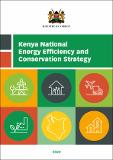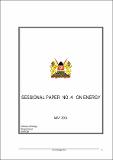Discussion Paper No. 341 of 2024 on Road to Nuclear Power in Kenya
Publication Date
2024Author
Type
KIPPRA Publicationsviews
downloads
Metadata
Show full item recordBy
Nyaware, Brian
Abstract/
Kenya plans to adopt nuclear energy to meet its growing energy demand, improve energy access and fast-track the energy transition through the nuclear power programme. The country is already taking the initial steps in implementing the programme, and this study seeks to assess Kenya’s readiness for the implementation. The study identifies 19 prerequisites for nuclear power programme and uses an exploratory and qualitative method to analyse the status, identify existing gaps and suggest potential solutions. The prerequisites are grouped into 7 pillars. The findings show that Kenya has made significant progress in meeting most of the prerequisites. Kenya has put in place a nuclear energy policy and strategy needed for a strong national position and is receiving support from the International Atomic Energy Agency (IAEA) and countries such as Russia and South Korea to improve management. That said, Kenya needs to implement the Integrated Nuclear Infrastructure Review (INIR) mission’s recommendation of developing a nuclear leadership programme. Kenya has ratified various international treaties, undertaken evaluation of the national emergency and response capability and adopted the United Nation’s (UN) security protocols. The country can further develop and adopt specific laws and regulations for control and prohibition of radioactive materials, and use of advance physical infrastructure to better meet the radiation protection prerequisite. Despite the efforts made, there is need to identify and implement specific funding mechanisms or models to cover the operational costs of running the nuclear applications. In addition, it is important to promote technology transfer and localization under the procurement prerequisite. With Kenya meeting these prerequisites adequately, the country can establish nuclear networks of different professionals, both locally and internationally based, to nurture and share nuclear power knowledge and build human capacity for nuclear energy. Also, the country can have more all-inclusive stakeholder and industrial involvements to increase public acceptance and improve perceptions. To acquire the necessary grid reliability, continued investments and upgrading of the grid is a priority. Further, better compensation methodologies to deal with land issues and having more inclusive stakeholder engagements are recommended to reduce the probability of public opposition.
Subject/
Nuclear Energy; Energy Transition; Nuclear Power; Atomic Energy; Radiation Protection
Publisher
The Kenya Institute for Public Policy Research and Analysis (KIPPRA)Series
DP/341/2024;Collections
- Discussion Papers [346]
Related items
Showing items related by title, author, creator and subject.
-
Kenya National Energy Efficiency and Conservation Strategy 2020
Ministry of Energy (Ministry of Energy, 2020)Energy Efficiency and Conservation is one of the key pillars of sustainable development in Kenya. The government has placed it as one of the priority areas of improvement in its efforts to enhance the quality of life of ... -
Sessional Paper No. 04 of 2004 on Energy
Republic of Kenya (Republic of Kenya, 2004)The aspiration of this Sessional Paper on Energy is to lay the policy framework upon which cost-effective, affordable and adequate quality energy services will be made available to the domestic economy on a sustainable ... -
Discussion Paper No. 74 of 2007 on Strategies for Securing Energy Supply in Kenya
Mwakubo, Samuel; Mutua, John; Ikiara, Moses & Aligula, Eric (The Kenya Institute for Public Policy Research and Analysis, 2007)Energy fuels virtually all the systems supporting mankind, and is essential in both rural and urban areas. Lack of adequate and reliable energy supply reduces the potential/or achieving major structural changes in rural ...




